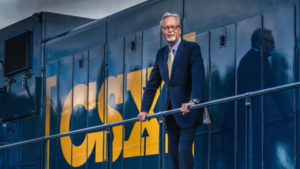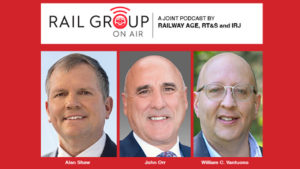Wisconsin rail deal quietly locked in
Written by jroodJust days before an election that could decide the fate of a planned high-speed rail line, state and federal administrators quietly signed a deal to commit the state to spending all $810 million of the federal stimulus cash allocated to the Milwaukee-to-Madison route, transportation officials confirmed Nov. 1, the Milwaukee Journal Sentinel reports.
The unannounced weekend
agreement frees outgoing Democratic Gov. Jim Doyle’s administration to sign
contracts for much if not all of the work. That could hamstring efforts by
Milwaukee County Executive Scott Walker and his fellow Republicans to kill the
project and spend the money on something else if they take control of the
governor’s office and either or both chambers of the state Legislature and
Congress on Nov. 2.
Walker, the GOP candidate
for governor, blasted the deal, saying, "This is just raw political power
at its worst. This is why the Doyle administration is corrupt and unwilling to
listen to taxpayers."
But Cari Anne Renlund,
executive assistant to state Transportation Secretary Frank Busalacchi,
insisted the timing wasn’t driven by the election. She said the Doyle
administration was following its original plan for the project to create
construction jobs as soon as possible.
"We are merely
trying to get the money obligated so the work can begin," said Renlund,
the No. 3 official at the state Department of Transportation. "These are
stimulus dollars. The goal of it was to get people working."
Renlund said state and
federal staffers worked out the deal over the weekend because they were busy
with other duties and that was the only time they could get together. She said
the agreement was not publicly announced because it had just been reached, but
it could be announced later. Officials responded to questions after the Journal
Sentinel learned of the deal.
Olivia Alair, spokeswoman
for the U.S. Department of Transportation, said Federal Railroad Administrator
Joe Szabo signed the deal because "the Wisconsin Department of
Transportation recently completed all of the steps necessary in order for their
grant agreement to be finalized, including their stakeholder agreements with
Canadian Pacific Railway and the Wisconsin & Southern Railroad. This is a
major step forward in advancing the national high-speed rail program, which
will connect the country, spur economic development and bring manufacturing
jobs to the U.S."
The Milwaukee-to-Madison
route would operate as
an extension of Amtrak’s existing Milwaukee-to-Chicago Hiawatha line. It could
one day be extended to the Twin Cities, as part of a larger Midwestern network
of fast, frequent trains. Service is to start in 2013, with six round trips
daily at a top speed of 79 mph, rising to a top speed of 110 mph by 2015.
Operating costs are
projected at $7.5 million a year, not counting the part covered by fares. But
Renlund said the state is already using federal funds to cover 90 percent of
the Hiawatha’s $5.2-million annual operating cost – leaving $520,000 a year for
state taxpayers to pick up – and hopes to do the same with the new line. That
would mean state taxpayers would be paying $750,000 a year for the service to
Madison.
Until now, the state and
federal governments had only reached deals to obligate Washington to release –
and Wisconsin to spend – about $52 million of the money for building the new
rail route. In August, Busalacchi and Renlund said the state expected to sign
contracts worth $300 million by the end of the year. Contracts have been signed
to start some work, such as bridges on the segment between Madison and
Watertown, and some of that work is starting, Renlund said.
Walker has vowed to shut down
construction of the line
if he’s elected Tuesday. Even with the federal government picking up
construction costs, Walker says he doesn’t want the state to spend money on
operating the line and would rather see the money spent on roads. His
Democratic opponent, Milwaukee Mayor Tom Barrett, backs the route as an
economic boon to the state.
Under federal rules,
shutting down the project would require the state to repay the federal
government for money already spent on the project. Doyle, Barrett and
Busalacchi say that money would go to other states’ rail projects, not to
Wisconsin roads.
Walker said he would do
everything in his power to end the project. And he vowed to make the rail line
an issue in President Barack Obama’s 2012 re-election campaign "if he tries
to force this down the throats of the taxpayers."
Polls show Walker in the
lead, and Republicans are believed to have a shot at capturing at least one
chamber of Congress. With Republicans campaigning against the stimulus
legislation, and Walker saying he would ask Congress to reallocate the rail
money to roads, obligating all of the rail funding could block GOP efforts to
move the cash elsewhere.
In July, after signing a
deal with Doyle to obligate $46 million of the rail money, U.S. Transportation
Secretary Ray LaHood proclaimed in Watertown that the rail line could not be
stopped. Walker scoffed
at that proclamation, and PolitiFact Wisconsin judged it false.
Passenger rail hasn’t
always been a partisan issue. This line was proposed by then-Gov. Tommy G.
Thompson, a Republican who has renounced his brainchild to fall in line with
his party.





